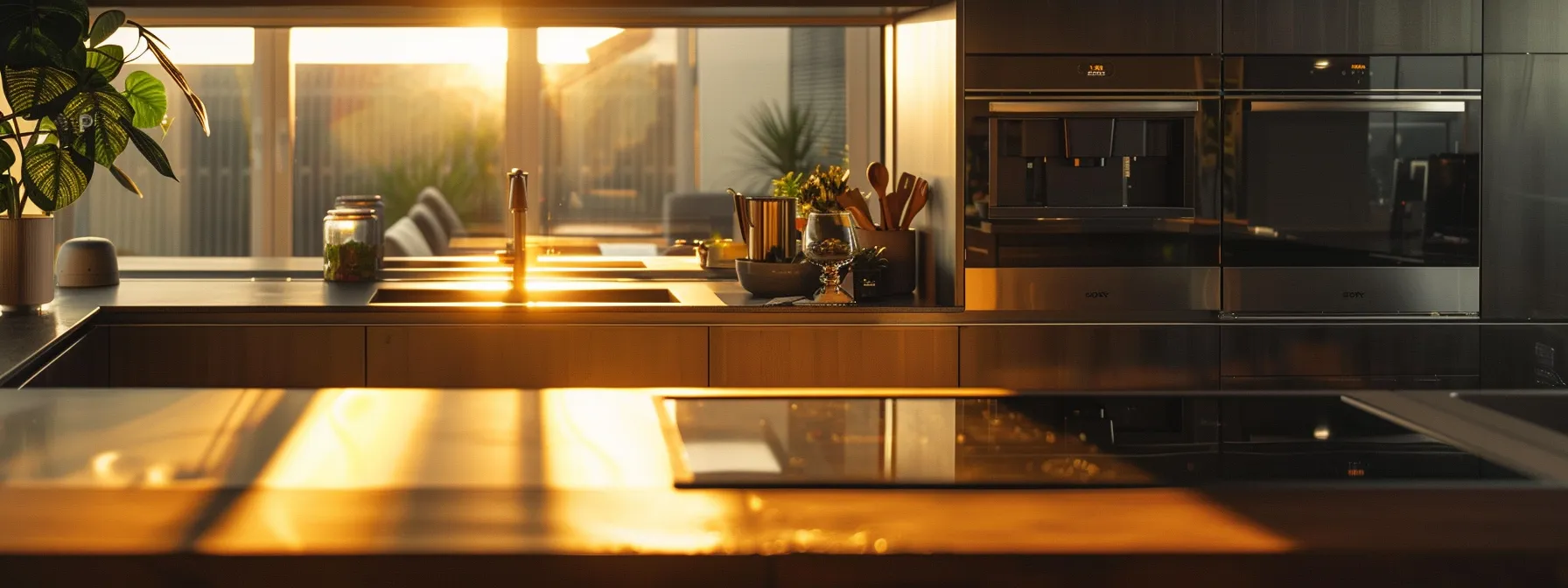Maximizing Your Kitchen’s Potential With Energy Efficient Appliances
To maximize the potential of any kitchen renovation, incorporating energy-efficient appliances is a vital step. As the Housing Industry Association highlights, these innovations significantly reduce carbon emissions while enhancing functionality. Among the options, brands like LG Electronics have emerged as leaders, particularly with their most efficient dishwasher that combines performance and eco-friendliness. Investing in energy-efficient appliances not only supports sustainability but also adds value to your home. Keep reading to discover the best choices for refrigerators, dishwashers, ranges, and countertop appliances that can transform your kitchen into a space that is both stylish and environmentally conscious.
Key Takeaways
- Energy Star ratings guide consumers in selecting energy-efficient kitchen appliances
- The size and style of refrigerators affect their overall energy efficiency
- Innovative features in appliances enhance efficiency and reduce environmental impact
- Proper maintenance and usage of appliances can maximize energy savings in the kitchen
- Community initiatives promote awareness and sustainable practices in energy consumption
Best Energy-Efficient Refrigerators

When exploring the best energy-efficient refrigerators, it is essential to grasp the nuances of Housing Industry Association Energy Star ratings as they serve as a reliable guide for consumers aiming to minimize pollution and promote energy conservation. Each model’s performance can vary significantly, making a comparative analysis essential for identifying top contenders that excel in energy savings. Additionally, understanding how the size and style of a refrigerator influence its efficiency can help homeowners make informed decisions, as larger units may consume more energy, while specific designs could optimize cooling processes. Innovative features, such as smart technology and advanced refrigerants, enhance energy efficiency significantly, aligning with the needs of modern chefs who prioritize both functionality and sustainability. Learning how to optimize the energy use of a refrigerator can lead to substantial long-term savings, allowing for a proactive approach to energy conservation that also benefits the environment.
Understanding Energy Star Ratings for Refrigerators
Energy Star ratings offer valuable insight for consumers looking to invest in energy-efficient kitchen appliances, including refrigerators. A model bearing the Energy Star label indicates that it meets stringent efficiency guidelines set by the U.S. Environmental Protection Agency and the Department of Energy. Understanding these ratings helps in recognizing refrigerators, such as those from Frigidaire, that not only conserve energy but also complement other energy-efficient products, like a water-efficient dishwasher from Housing Industry Association, creating a cohesive and responsible kitchen environment.
Comparing Top Models for Energy Savings
When assessing the best energy-efficient refrigerators, homeowners should consider not only the initial purchase price but also long-term energy consumption. models that carry the Energy Star certification can dramatically reduce electricity costs, aligning with standards established by the United States Environmental Protection Agency Housing Industry Association. Additionally, pairing an energy-efficient refrigerator with energy star kitchen appliances, such as an energy star microwave, enhances overall kitchen sustainability.
The Impact of Refrigerator Size and Style on Efficiency
The size and style of a refrigerator significantly influence its energy efficiency. Larger refrigerators often consume more energy compared to compact models, so selecting an appropriately sized unit is crucial for effective energy management; additionally, opting for a model with modern features like sensors can enhance performance by regulating cooling based on usage. Styles such as counter-depth or integrated designs can also facilitate better airflow and reduce energy consumption, aligning perfectly with kitchen renovations other energy-efficient appliances like slow cookers and ventilators Housing Industry Association.
- Consider the refrigerator size: Opt for a unit that meets storage needs without excess capacity.
- Explore various styles: Choose designs that promote airflow efficiency.
- Utilize modern technology: Look for models equipped with sensors for optimized energy use.
Innovative Features That Enhance Energy Efficiency
Innovative features in energy-efficient refrigerators play a crucial role in reducing energy consumption and minimizing impact on the environment. For instance, refrigerators equipped with smart sensors can adjust cooling levels based on the contents, significantly enhancing efficiency and contributing to net zero emissions goals. When coupled with other eco-friendly appliances like the best economical dishwashers and modern stoves, homeowners can effectively combat climate change while ensuring their kitchen remains functional and sustainable for years to come.
How to Optimize Your Refrigerator’s Energy Use
To optimize the energy use of a refrigerator, homeowners should consider proper placement and temperature settings. Positioning the appliance away from direct sunlight and heat sources, such as ovens or heat pumps, ensures it operates efficiently. Regular maintenance, including cleaning the coils and ensuring door seals are intact, reduces waste and maximizes performance.
Additionally, integrating other energy-efficient appliances, such as a water saver dishwasher, contributes to an overall energy-saving strategy in the kitchen. Utilizing a database of appliance efficiency ratings can guide consumers in making informed choices when upgrading their kitchen equipment while minimizing energy consumption.
The Long-Term Savings of Investing in an Efficient Refrigerator
Investing in an energy-efficient refrigerator yields significant long-term savings that extend beyond just reduced electricity bills. With an Energy Star certification, these machines minimize energy consumption, subsequently decreasing greenhouse gas emissions and fostering environmental protection. This proactive approach not only lowers costs associated with water heating and electricity but also contributes positively to the broader effort of combating climate change.
As homeowners embrace sustainability, energy-efficient appliances take center stage in every kitchen. After exploring the best energy-efficient refrigerators, it’s time to uncover the top choices in dishwashers that enhance both performance and conservation.
Best Energy-Efficient Dishwashers

Energy-efficient dishwashers play a crucial role in optimizing kitchen functionality while promoting sustainability. Understanding the efficiency of dishwasher cycles is essential for consumers who wish to strike a balance between performance and utility. Key features in energy-saving models, such as stainless steel interiors and advanced washing technologies, contribute significantly to their effectiveness. Moreover, analyzing water consumption alongside energy efficiency allows homeowners to make informed decisions that impact both finances and the environment. The capacity of a dishwasher also influences energy use; selecting models with larger capacities can lead to fewer cycles and reduced resources. To further enhance efficiency, adopting eco-friendly dishwashing habits, such as proper loading techniques and cycle selection, is vital. A comprehensive FAQ section often provides valuable insights into maximizing the advantages of these systems during use, ensuring homeowners get the most out of their investment while supporting recycling and overall environmental conservation.
Decoding the Efficiency of Dishwasher Cycles
Understanding the efficiency of dishwasher cycles is crucial for optimizing kitchen performance. Advanced electronics integrated into modern dishwashers utilize real-time data to adjust wash cycles based on the level of soiling, humidity, and the quantity of dishes loaded, ensuring that each cycle operates at peak efficiency. These innovations not only minimize energy consumption but also reduce the need for excessive lighting and heating in the kitchen, creating a more sustainable environment overall.
Key Features to Look for in Energy-Saving Models
When assessing energy-saving dishwashers, homeowners should prioritize models that feature Energy Star certification, which signifies lower energy consumption and reduced greenhouse gas emissions. Furthermore, options like Miele offer advanced convection drying technology that enhances cleaning efficiency while consuming less energy. These key features not only support sustainability but also promote long-term savings on utility bills.
Water Consumption vs. Energy Efficiency in Dishwashers
When selecting a dishwasher, understanding the relationship between water consumption and energy efficiency is vital. Many modern brands offer dishwashers that utilize advanced pump technology to optimize water usage while maintaining high energy efficiency. Standard models consume more water and energy, making it crucial for homeowners to consider both aspects when upgrading, particularly in homes with other energy-efficient appliances like cooktops, ensuring an integrated approach to sustainability.
The Role of Dishwasher Capacity in Energy Use
The capacity of a dishwasher plays a significant role in its overall energy consumption, where larger units are generally more efficient when loaded to full capacity. By maximizing each cycle, homeowners can significantly reduce their carbon footprint while benefiting from the efficiency of their energy star electric stoves and convection oven in tandem with their dishwasher. A well-sized unit, equipped with a smart thermostat, can adapt its operations based on the load size, enhancing overall energy efficiency.
Tips for Maximizing Dishwasher Efficiency During Use
To maximize dishwasher efficiency, homeowners should take advantage of the innovative technologies available in modern appliances. Ensuring that the dishwasher is fully loaded before running a cycle, while avoiding overcrowding, plays a crucial role in conservation efforts; this strategy not only reduces water usage but also contributes to more environmentally friendly practices. Additionally, linking energy use to renewable energy sources and taking advantage of tax credits for energy-saving appliances can help offset the initial investment, ultimately enhancing the sustainability of the home kitchen alongside other appliances like ovens.
- Load the dishwasher efficiently without overcrowding.
- Utilize energy-saving features and settings.
- Consider connecting appliances to renewable energy sources.
- Explore available tax credits for energy-efficient appliances.
Eco-Friendly Dishwashing Habits to Adopt
Adopting eco-friendly dishwashing habits can significantly contribute to kitchen sustainability and a healthier climate. Homeowners should consider running their high-efficiency dishwasher only when fully loaded to maximize water and energy savings. Additionally, utilizing energy-efficient appliances, such as a modern toaster, can enhance overall kitchen efficiency and support an environmentally conscious lifestyle, potentially making homeowners eligible for helpful tax credits.
- Run the high-efficiency dishwasher only when full.
- Utilize other energy-efficient appliances like a toaster.
- Stay informed about available tax credits for energy-efficient upgrades.
After exploring the best energy-efficient dishwashers, it’s time to turn up the heat in the kitchen with energy-efficient ranges. These ranges not only elevate cooking performance but also contribute to a more sustainable home.
Best Energy-Efficient Ranges

Exploring the best energy-efficient ranges reveals a direct influence on both culinary performance and energy consumption within the kitchen. As homeowners weigh the benefits of electric versus gas, understanding which option maximizes efficiency is imperative. The adoption of convection ovens showcases a significant leap in cooking efficiency, while induction cooktops represent a modern solution that transforms traditional cooking methods. Additionally, practical approaches to minimize energy use during meal preparation can result in substantial savings. Key features in energy-efficient ranges, much like those found in an energy-saving dishwasher or a microwave oven, streamline kitchen operations and enhance sustainability. Incorporating smart cooking practices not only utilizes technology effectively but also complements the efficiency offered by other small appliances in the kitchen, such as clothes dryers, ultimately creating a comprehensive energy-saving strategy.
Electric vs. Gas: Which Is More Energy Efficient?
When considering energy efficiency in kitchen ranges, the choice between electric and gas can significantly impact both performance and environmental effects. Energy-saving electric stoves, such as those provided by Whirlpool Corporation, tend to consume less overall energy compared to gas models, thereby reducing air pollution associated with fuel combustion. Additionally, for homeowners seeking to upgrade to an electric range, various rebates offer financial incentives to support this eco-friendly transition while enhancing the cooking experience for meals.
- Energy-saving electric stoves are generally more efficient.
- Electric appliances reduce overall energy consumption.
- Upgrading can qualify homeowners for rebates promoting energy efficiency.
The Efficiency Benefits of Convection Ovens
Convection ovens offer significant efficiency benefits that enhance the cooking experience in modern kitchens. By utilizing a fan to circulate hot air, these ovens ensure food is cooked evenly and quickly, reducing overall cooking time and energy consumption compared to traditional gas stoves. When combined with energy-efficient appliances like induction cooking systems and Bosch Energy Star dishwashers, homeowners can create a streamlined culinary environment that optimizes both functionality and sustainability, facilitating a high-performance kitchen that meets contemporary cooking demands.
Induction Cooktops: A Game-Changer in Kitchen Efficiency
Induction cooktops represent a significant advancement in kitchen technology, offering unparalleled efficiency and precision in cooking. By directly heating the cookware through electromagnetic energy, these appliances minimize heat loss, allowing meals to cook more quickly while consuming less power. Homeowners looking to enhance their culinary efficiency will find that induction cooktops not only expedite cooking times but also promote a safer kitchen environment due to their cool-to-the-touch surfaces when not in use.
How to Minimize Energy Use While Cooking
Minimizing energy use during cooking requires a strategic approach that maximizes appliance efficiency. Homeowners can utilize the right-sized pots and pans to match burner sizes, facilitating quicker heat transfer and reducing energy waste. Furthermore, preheating ovens only when necessary and keeping lids on pots can significantly enhance heat retention, promoting more efficient cooking processes.
Important Features in Energy-Efficient Ranges
Energy-efficient ranges are designed with several key features that enhance their functionality and sustainability. Look for models that incorporate smart technology, which can optimize cooking times and temperatures based on the specific dish being prepared, ensuring minimal energy waste. Additionally, options that offer precise temperature controls and easy-clean surfaces allow for efficient usage and upkeep, making these appliances a valuable addition to environmentally conscious kitchens.
Cooking Smart: Energy-Saving Practices for Everyday Use
Smart cooking practices are essential for maximizing energy efficiency in the kitchen. Homeowners should consider utilizing lids on pots and pans during cooking, as this helps retain heat and reduces cooking time, leading to lower energy consumption. Additionally, coordinating meal preparation and using appliances like slow cookers or microwaves for specific tasks can optimize energy use, ensuring the kitchen operates efficiently.
Implementing energy-efficient cooking techniques will foster a more sustainable kitchen environment:
Energy-efficient ranges set a strong foundation for a sustainable kitchen. Now, let’s explore the top countertop appliances that can further elevate your eco-friendly cooking experience.
Best Energy-Efficient Countertop Appliances

Integrating energy-efficient countertop appliances into the kitchen can lead to significant savings and enhanced culinary experiences. Small appliances, often overlooked, pack a powerful punch when it comes to energy conservation. Choosing energy-efficient blenders and mixers not only streamlines meal preparation but also minimizes energy usage. Additionally, selecting low-energy kettles and coffee makers contributes to a more sustainable kitchen environment. Understanding wattage is essential in making informed decisions about countertop appliances, as lower wattage often correlates with reduced energy consumption. Adopting efficiency tips for utilizing these small devices effectively and implementing best practices for appliance care ensures optimal performance while further decreasing energy costs. With thoughtful selections and practices, homeowners can maximize their kitchen’s potential while supporting eco-friendly initiatives.
Small Appliances With Big Energy Savings
Energy-efficient countertop appliances are essential for homeowners aiming to enhance kitchen functionality while conserving energy. Devices such as blenders, food processors, and coffee machines designed with advanced technology not only simplify meal preparation but also operate with lower energy consumption. By selecting these smaller yet impactful appliances, individuals can significantly reduce overall household energy costs while contributing to a more sustainable lifestyle.
The Advantages of Energy-Efficient Blenders and Mixers
Energy-efficient blenders and mixers present significant advantages for those looking to optimize kitchen operations and reduce energy consumption. These appliances utilize advanced motor technology to achieve maximum blending and mixing efficiency, often requiring less power to achieve the same results as their conventional counterparts. As a result, homeowners benefit from lower energy bills while enjoying seamless food preparation, making these appliances a smart investment for both function and sustainability.
Selecting Low-Energy Kettles and Coffee Makers
Selecting low-energy kettles and coffee makers is essential for homeowners aiming to enhance energy conservation while enjoying their favorite beverages. These appliances are designed to heat water efficiently, minimizing energy waste and reducing the overall carbon footprint. Investing in options with simple yet effective features can lead to noticeable savings on energy bills over time.
When evaluating the energy efficiency of kettles and coffee makers, consumers should pay attention to their wattage ratings and the speed of heating. Appliances that heat water quickly often consume less energy because they minimize the time spent drawing power. For a better understanding of their efficiency, consider the following comparison of popular models:
The Importance of Wattage in Countertop Appliances
Understanding the wattage of countertop appliances is crucial for consumers who aim to optimize energy efficiency in their kitchens. Appliances with lower wattage typically consume less energy, resulting in reduced electricity bills while performing effectively. By selecting devices with efficient power ratings, homeowners can enhance their culinary experiences without compromising sustainability.
Choosing appliances wisely can lead to better energy management:
- Identify wattage ratings to gauge energy consumption.
- Opt for devices that offer high performance with lower wattage.
- Monitor overall kitchen energy use by considering all countertop appliances.
Efficiency Tips for Using Your Small Kitchen Appliances
To enhance the efficiency of small kitchen appliances, homeowners should prioritize proper usage and maintenance. This involves ensuring appliances are fully loaded before operating, which maximizes their capacity without wasting energy. Additionally, regularly cleaning and checking the devices will help maintain optimal performance and extend their lifespan:
By implementing these efficiency tips, homeowners can ensure their kitchen appliances operate at peak performance while also contributing to energy conservation efforts.
The Best Energy-Saving Practices for Appliance Care
To maintain energy efficiency in countertop appliances, homeowners should adopt several best practices. Regular cleaning of all appliance surfaces and interior parts ensures optimal performance, as accumulated grease and debris can hinder efficiency. Using appliances only when full or at maximum capacity enhances their energy-saving capabilities and minimizes waste.
Implementing a routine maintenance schedule can further extend the lifespan of these devices, preventing the need for premature replacements. Scrutinizing settings and features can lead to improved energy management and usage of these small yet powerful tools:
- Clean appliances regularly to maintain efficiency.
- Use appliances at maximum capacity to reduce energy waste.
- Establish a maintenance schedule for longevity.
Energy-efficient countertop appliances not only streamline kitchen tasks but also promote a greener lifestyle. Now, let’s shift our focus to the joy of community and connection through sharing.
Sharing Is Nice

Engaging friends and family in conversations about energy efficiency can create a ripple effect, enhancing awareness within the community. Hosting a demonstration in an energy-efficient kitchen showcases the practical benefits of using modern appliances, inspiring others to make informed choices. Community appliance swap programs provide an opportunity for neighbors to exchange underutilized devices, promoting sustainability and resourcefulness. Additionally, crafting an energy-efficient kitchen guide empowers individuals to implement eco-friendly practices in their homes. Collaborative efforts, such as bulk buying energy-saving appliances, can offer significant savings while fostering a collective commitment to sustainability. Leveraging social media platforms serves as an effective means to spread awareness, encouraging a broader audience to participate in the journey towards an energy-conscious lifestyle.
Educating Friends and Family on Energy Efficiency
Educating friends and family about energy efficiency can create a positive impact within the community. Sharing insights on the benefits of energy-efficient appliances not only promotes sustainable practices but also encourages collective action towards reducing energy consumption. By engaging in discussions and demonstrating the functionality of these appliances, individuals can inspire others to make environmentally conscious choices in their own homes.
Hosting an Energy-Efficient Kitchen Demonstration
Hosting an energy-efficient kitchen demonstration serves as an engaging way to showcase the advantages of modern appliances. Attendees can witness firsthand the effectiveness and ease of using energy-saving devices, fostering a deeper understanding of their benefits. This interactive approach not only inspires participants to consider energy efficiency in their kitchens but also cultivates a community committed to sustainable practices.
The Benefits of Community Appliance Swap Programs
Community appliance swap programs provide an excellent opportunity for households to exchange items they no longer need while acquiring gently used appliances at no cost. This not only encourages sustainable practices by reducing waste but also fosters a sense of community among participants who share the goal of promoting energy efficiency. By participating in such programs, individuals can save money while ensuring their kitchens remain equipped with the latest energy-efficient appliances.
The key benefits of community appliance swap programs include:
- Reducing waste by offering pre-loved appliances a new home.
- Encouraging local connections and community engagement.
- Sustaining financial savings through free exchanges, promoting eco-conscious living.
Creating an Energy-Efficient Kitchen Guide for Others
Creating an Energy-Efficient Kitchen Guide for others involves sharing essential strategies and best practices that promote sustainable living and responsible energy consumption. Individuals can compile concise information highlighting the benefits of specific appliances, maintenance tips, and energy-saving habits that can be easily implemented in daily routines. By providing a clear roadmap, this guide can empower others to make informed decisions that enhance both efficiency and their kitchen experience:
- Outline the importance of energy-efficient appliances.
- Include practical tips for appliance usage and maintenance.
- Share methods for monitoring energy consumption effectively.
- Encourage community engagement through discussions and events.
- Highlight available resources and incentives for making eco-friendly choices.
Collaborative Savings: Bulk Buying Energy-Saving Appliances
Bulk buying energy-saving appliances can provide substantial financial benefits while fostering a collective commitment to sustainability among community members. By pooling resources and purchasing together, households can take advantage of wholesale prices, thus reducing the overall cost of upgrading to efficient products. This collaborative approach not only enhances individual kitchen functionality but also contributes to a wider movement towards environmentally friendly living within the community.
Using Social Media to Spread Awareness on Energy Efficiency
Social media serves as a powerful platform for promoting energy efficiency in kitchens, bridging the gap between awareness and action. By sharing informative content, engaging visuals, and practical tips, individuals can inspire their circles to adopt more sustainable practices at home. Creating discussions around energy-efficient appliances not only educates followers but also fosters a community committed to eco-friendly living.
Some key methods to utilize social media in this initiative include:
- Posting before-and-after photos of energy-efficient upgrades.
- Sharing articles about the benefits of eco-friendly appliances.
- Encouraging followers to share their energy-saving tips and experiences.
